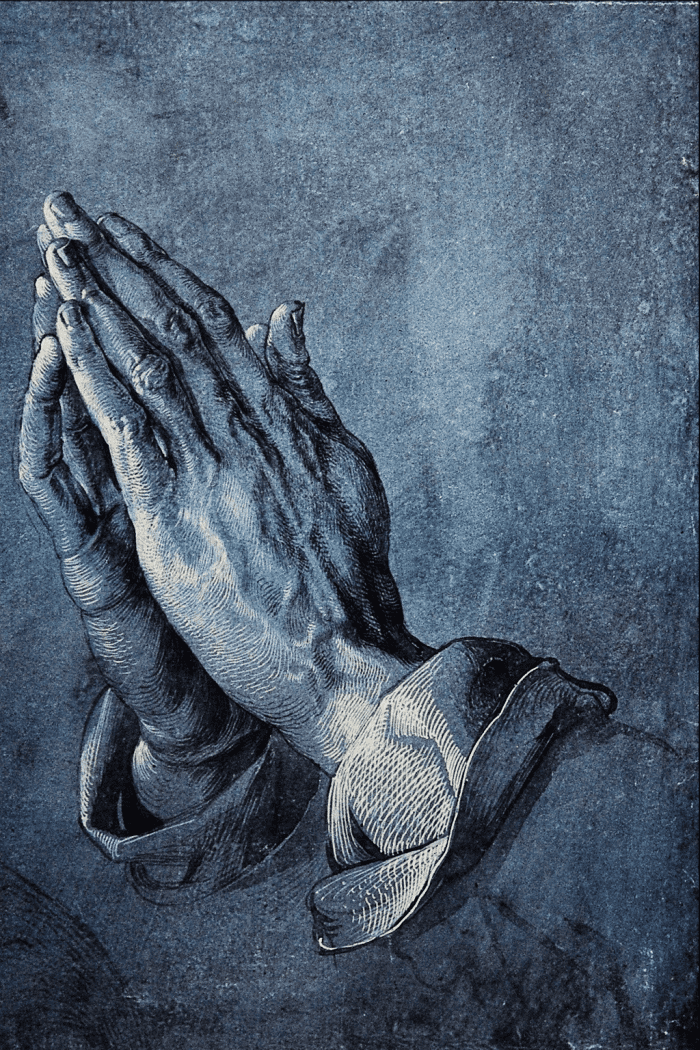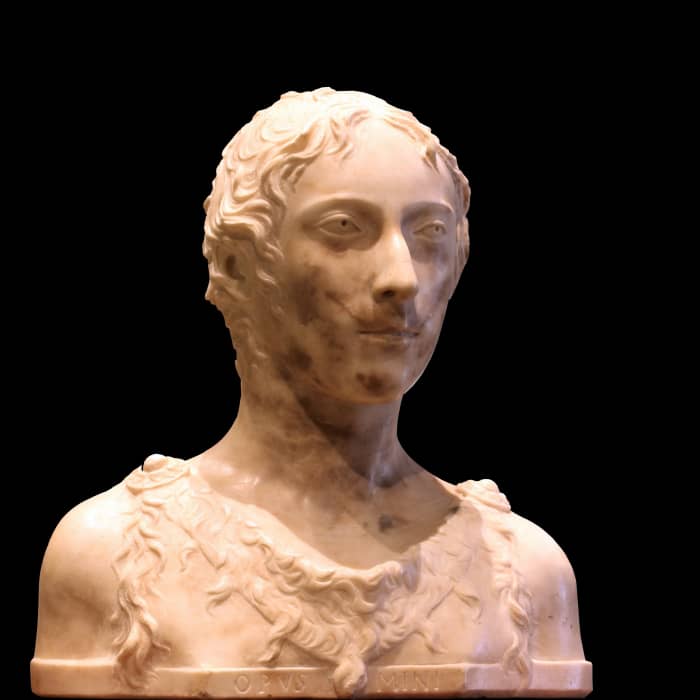Humanism's Main Effect On The Writing Of History Was
Rebecca Graf is a seasoned writer with nearly a decade of experience and degrees in accounting, history, and creative writing.
If any movement touches the arts and the education of a society, it cannot avoid the religious areas of society. Religion could be found in all areas of the Medieval world. It dictated economy, morals, and the political realm. A fine line existed between the Roman Catholic Church and those that were in secular power of an area. As Humanism rose, it was not pushed from the church or banned as heresy. It was welcomed by some of the Popes to use to their advantage. The Church was quick to embrace the Humanism religious painting that brought the saint and the Lord to life and prompted the soul and heart to respond. These images were used to calm those under duress, to bring the Holy Mother closer, or to tell a story with vivid images.

By Albrecht Dürer - Corel Professional Photos CD-ROM, Public Domain, https://commons.wikimedia.org/w
Crippling Effect
Though Humanism was used to strengthen the church's power, it was also used to cripple it. Martin Luther's humanist education led him to read more of the original works of the scripture which also led him to question many of the Church's actions. Humanism brought faith down to man and did not keep it out of reach of him and only in the hands of the Church. Religion became personal again.

By Photograph by Rama, Wikimedia Commons, Cc-by-sa-2.0-fr, CC BY-SA 2.0 fr, https://commons.wikimedi
Politics
The political realm was heavily influenced by Humanism. Parties involved in political intrigue were not adverse to using the arts to push their agenda. The Venetian Republic "was glorified by the commissioning and display of official portraits of its doges, and of scenes of Venetian victories." A great political piece that reflects much of the Humanism of the era was The Prince by Niccolo Machiavelli. Through this book, Machiavelli explores the concept of the perfect and the not-so-perfect ruler. He looks into the whys and explains the consequences. Instead of giving rulers gold, flattery, and more power, Machiavelli gives them the "knowledge of the actions of great men, learned from long experience in modern affairs and from constant reading of ancient ones."

By Eduard Lebiedzki, after a design by Karl Rahl - Own work, Public Domain, https://commons.wikimedi
Philosophy
It almost goes without saying how the Humanism effected philosophy. Petrarch was one of the humanist that dug deep into the world and into man from a philosophical aspect. It was after he climbed a mountain that he contemplated, "I wondered at the natural nobility of our soul, save when it debases itself of its own free will, and deserts its original estate, turning what God has given it for its honour into dishonour." A trip up a mountain with his brother turned into a time of in-depth contemplations. His self-reflection gave him the title of Father of Humanism.

By Józef Simmler - Scanned from album "Malarstwo Polskie w zbiorach za granicą" by Stefania Krzyszto
Great Minds
Humanism woke up the minds of man as they began to discover more of the old civilizations. Instead of seeing the past through the eyes of others, man began to see the world past and present with clearer eyes. The ancients were "no longer obscure, their personalities restored, replaced in the context of their own society, the appeal of the authors the Middle Ages had known, Plato, Aristotle, Virgil, Cicero and Ovid, became stronger than ever, and they had been joined by a host of others." There was more to the world than what had been set down by the late Middle Ages and those that were in power. The great artists and politicians from centuries before were being rediscovered and expanded on. Creativity exploded in writing, painting, sculpture, politics, and even religion.

By Internet Archive Book Images - https://www.flickr.com/photos/internetarchivebookimages/1457823449
Great Changes
The Renaissance was a time of great changes throughout Europe. Art became real. The classic texts were brought back into the classrooms. Education expanded to levels that had not been seen in centuries. Religion began to look deeper into itself. Rulers had examples presented to them to model and learn from. Humanism was the single most revolutionary concept the Renaissance gave the world. It touched all aspects of society and lifted mankind up.

By Giovanni Dall'Orto March 2005, Attribution, https://commons.wikimedia.org/w/index.php?curid=60132
Bibliography
Burke, Peter. The Italian Renaissance: Culture and Society in Italy. Princeton: Princeton, 1999.
Castiglione, Baldesar. The Book of the Courtier, trans. Leonard Eckstein Opdycke.New York: Charles Scribner's Sons, 1903.
Hale, J.R. Renaissance Europe 1480-1520. Malden: Blackwell, 200.
Machiavelli, Niccolo. The Prince, New York: Bantam, 2003.
Mirandola, Pico della. "Oration on the Dignity of Man." World Cultures. http://www.wsu.edu/~dee /REN/ORATION.HTM (accessed April 7, 2010).
Petrach, The Ascent to Mount Venoux, http://history.hanover.edu/early/petrarch/pet17.htm.
JenChuLiChaeng on May 03, 2020:
Which effect was more historic?
granddaddy da vinci on May 09, 2019:
how did they do it tho
alisonmcg on May 05, 2019:
how did humanism challenge religious perspectives in the renaissance period?
shockyboi on April 07, 2019:
How did Humanists effect the economy at the time?
Rebecca Graf (author) from Wisconsin on October 01, 2017:
I think we should. I really do wish my kids had a more classical education as kids today are not taught how to think on their own.
threekeys on October 01, 2017:
Really enjoyed your article. I am biased however, as I have a love for the Renaissance period. Do you think we could or should revive it now, in a 21 st century type of way?
Humanism's Main Effect On The Writing Of History Was
Source: https://owlcation.com/humanities/Humanism-Effect-on-the-Renaissance
Posted by: blanksenone1940.blogspot.com

0 Response to "Humanism's Main Effect On The Writing Of History Was"
Post a Comment